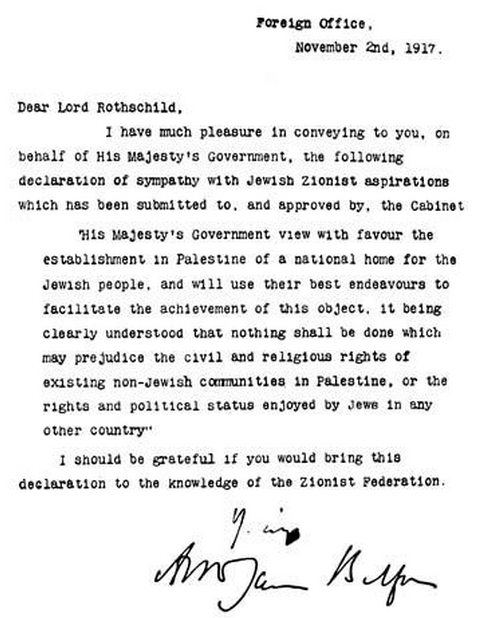Balfour Declaration Is Released

November 2, 1917
British Foreign Secretary Arthur Balfour sent Lord Rothschild, the head of the British Zionist Organization, a private letter expressing endorsement for the Zionist cause, which had been sought after by the leadership of the Zionist Organization from the British government for some time.
While this private letter had no international legal standing, the Declaration was received with great excitement by the Zionist leaders and recent immigrants to Palestine. The Declaration also evoked the consternation of Arab leaders, primarily in Syria and the Arabian peninsula. They thought that after the defeat of the Ottoman Empire, Palestine should be territory under their control. The Balfour Declaration was discussed at the 1919 Paris Peace conference and again when the future of the Middle East was ratified in the 1920 San Remo Treaty. When the British issued their outline for how Palestine would be governed, the contents of the Balfour Declaration were found in the League of Nation’s July 1922 ratification of how Palestine would operate, The Articles of the Palestine Mandate. Thus the League of Nations gave the Declaration international sanction and legitimacy.
The Articles of the Mandate encourage the development of “a Jewish national home in Palestine” facilitated by Great Britain. Controlling Palestine physically fit conveniently with larger British strategic interests in the Middle East. Before, during, and after World War I, British strategic interests included the establishment of a “land bridge’ from the Persian Gulf to the Mediterranean in order to ensure British economic and political influence and control from India to Egypt. For the British, the Declaration was one of many building blocks that asserted British influence and territorial control over the Middle East, connecting Britain’s Arab allies, clients, kings, and tribal leaders into a desired geo-political network of influence across the region. This strategy included agreements with Arab tribal leaders in Yemen, Oman, Kuwait, Qatar, Afghanistan, and the Arabian Peninsula. Securing Palestine as geographic buffer for British presence in Egypt and protection of the Suez Canal was necessary from Britain’s viewpoint. Thus, Zionist and British interests dovetailed into a workable and functioning symbiosis.